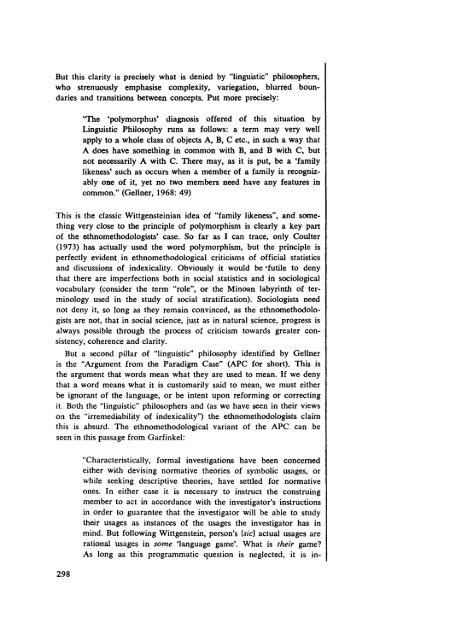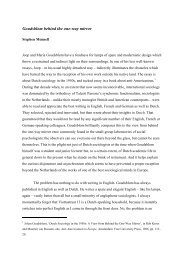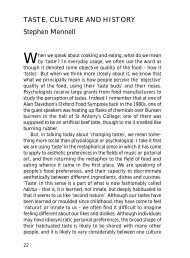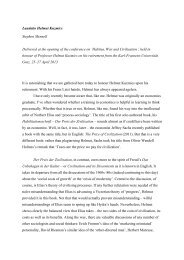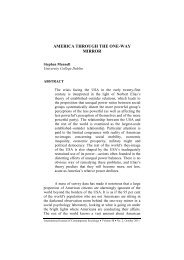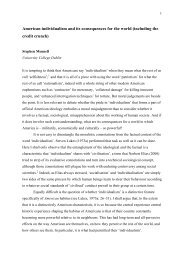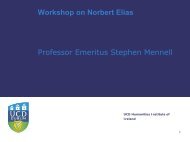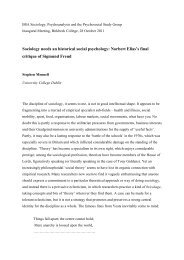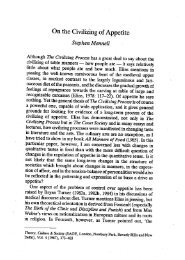Ethnomethodology and the New "Methodenstreit" - Stephen Mennell
Ethnomethodology and the New "Methodenstreit" - Stephen Mennell
Ethnomethodology and the New "Methodenstreit" - Stephen Mennell
You also want an ePaper? Increase the reach of your titles
YUMPU automatically turns print PDFs into web optimized ePapers that Google loves.
But this clarity is precisely what is denied by "linguistic" philosophers,who strenuously emphasise complexity, variegation, blurred boundaries<strong>and</strong> transitions between concepts. Put more precisely:"The 'polymorphus' diagnosis offered of this situation byLinguistic Philosophy runs as follows: a term may very wellapply to a whole class of objects A, B, C etc., in such a way thatA does have something in common with B, <strong>and</strong> B with C, butnot necessarily A with C. There may, as it is put, be a 'familylikeness' such as occurs when a member of a family is recognizablyone of it, yet no two members need have any features incommon." (Gellner, 1968: 49)This is <strong>the</strong> classic Wittgensteinian idea of "family likeness", <strong>and</strong> somethingvery close to <strong>the</strong> principle of polymorphism is clearly a key partof <strong>the</strong> ethnomethodologists' case. So far as I can trace, only Coulter(1973) has actually used <strong>the</strong> word polymorphism, but <strong>the</strong> principle isperfectly evident in ethnomethodological criticisms of official statistics<strong>and</strong> discussions of indexicality. Obviously it would be -futile to denythat <strong>the</strong>re are imperfections both in social statistics <strong>and</strong> in sociologicalvocabulary (consider <strong>the</strong> term "role", or <strong>the</strong> Minoan labyrinth of terminologyused in <strong>the</strong> study of social stratification). Sociologists neednot deny it, so long as <strong>the</strong>y remain convinced, as <strong>the</strong> ethnomethodologistsare not, that in social science, just as in natural science, progress isalways possible through <strong>the</strong> process of criticism towards greater consistency,coherence <strong>and</strong> clarity.But a second pillar of "linguistic" philosophy identified by Gellneris <strong>the</strong> "Argument from <strong>the</strong> Paradigm Case" (APC for short). This is<strong>the</strong> argument that words mean what <strong>the</strong>y are used to mean. If we denythat a word means what it is customarily said to mean, we must ei<strong>the</strong>rbe ignorant of <strong>the</strong> language, or be intent upon reforming or correctingit. Both <strong>the</strong> "linguistic" philosophers <strong>and</strong> (as we have seen in <strong>the</strong>ir viewson <strong>the</strong> "irremediability of indexicality") <strong>the</strong> ethnomethodologists claimthis is absurd. The ethnomethodological variant of <strong>the</strong> APC can beseen in this passage from Garfinkel:298"Characteristically, formal investigations have been concernedei<strong>the</strong>r with devising normative <strong>the</strong>ories of symbolic usages, orwhile seeking descriptive <strong>the</strong>ories, have settled for normativeones. In ei<strong>the</strong>r case it is necessary to instruct <strong>the</strong> construingmember to act in accordance with <strong>the</strong> investigator's instructionsin order to guarantee that <strong>the</strong> investigator will be able to study<strong>the</strong>ir usages as instances of <strong>the</strong> usages <strong>the</strong> investigator has inmind. But following Wittgenstein, person's [sic] actual usages arerational usages in some 'language game'. What is <strong>the</strong>ir game?As long as this programmatic question is neglected, it is in-


